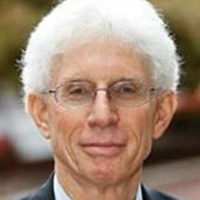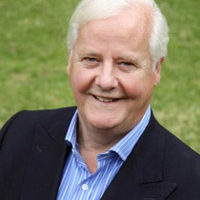About Us
AMERICAN CHARTER
The American Charter of Freedom of Religion and Conscience is an initiative of the Religious Freedom Institute.
American Charter Co-Chairs

William A. Galston
CO-CHAIR
William A. Galston holds the Ezra K. Zilkha Chair in the Brookings Institution’s Governance Studies Program, where he serves as a senior fellow, and is College Park Professor at the University of Maryland. A former policy advisor to President Clinton and presidential candidates, Galston is an expert on domestic policy, political campaigns, and elections. His current research focuses on designing a new social contract and the implications of political polarization. Galston is the author of eight books and more than 100 articles in the fields of political theory, public policy, and American politics. His most recent books are Liberal Pluralism: The Implications of Value Pluralism for Political Theory and Practice (Cambridge, 2002), The Practice of Liberal Pluralism (Cambridge, 2004), and Public Matters: Politics, Policy and Religion in the 21st Century (Rowman & Littlefield, 2005).

Os Guinness
CO-CHAIR
Os Guinness is a prolific author, social critical and former Guest Scholar at the Woodrow Wilson Center for International Studies, Visiting Fellow at the Brooking Institution, and Senior Fellow at the EastWest Institute in New York. He is currently a senior fellow at the Oxford Centre for Christian Apologetics in Oxford. Guinness has published on a wide range of topics, writing or editing more than thirty books, including The Global Public Square: Religious Freedom and the Making of a World Safe for Diversity (2013). He gained notoriety for his efforts drafting the “Global Charter of Conscience,” which was published at the European Union Parliament in 2012, and the 1986 “Williamsburg Charter,” which was signed by Gerald Ford, Jimmy Carter, Warren Burger, William Rehnquist, and Coretta Scott King, among other American leaders. Both charters affirmed the fundamental value of religious freedom and called for reinvigorated debate on the role of religion in the public square.
Project Directors
PROJECT DIRECTOR
Byron R. Johnson
Byron R. Johnson is Distinguished Professor of the Social Sciences at Baylor University. He is a leading authority on the scientific study of religion, the efficacy of faith-based organizations, and criminal justice.
Byron is the founding director of the Baylor Institute for Studies of Religion (ISR) as well as director of the Program on Prosocial Behavior. Before joining the faculty at Baylor University, Johnson directed research centers at Vanderbilt University and the University of Pennsylvania. In addition to private grant projects, he has directed grant projects from the U.S. Departments of Labor and Justice, National Institutes of Health, and United States Institute for Peace.
He is the author of more than 200 articles and books, including More God, Less Crime: Why Faith Matters and How it Could Matter More (2011), The Angola Prison Seminary: Effects of Faith-Based Ministry on Identity Transformation, Desistance, and Rehabilitation (2016), and The Quest for Purpose: The Collegiate Search for a Meaningful Life (2017). His recent publications include examinations of the impact of faith-based programs on recidivism reduction and prisoner reentry.
PROJECT DIRECTOR
Brian W. Walsh
Brian W. Walsh is an attorney who co-directs the American Charter initiative. For the past dozen years, he has built and led diverse partnerships and coalitions—both in and outside of Washington, D.C.—to counter polarization and partisan stalemates on challenging issues, including freedom of religion and conscience and criminal-justice reform. His current work includes serving as executive director of the Faith & Giving Coalition, a multi-denominational, multi-faith initiative whose mission is to protect and promote faith-based and other charitable giving through education and advocacy.
As a research program executive director at the Ethics and Public Policy Center in Washington, Brian convened widely attended national religious freedom conferences bringing together national leaders of the Adventist, Buddhist, Catholic, Eastern Orthodox, Evangelical, Hindu, Jewish, Latter-day Saint, Muslim, Sikh, and numerous other faith communities. He has developed initiatives supported by leaders of faith communities representing over 100 million Americans.
In collaboration with diverse partner organizations including the American Civil Liberties Union (ACLU) and National Association of Criminal Defense Lawyers, Walsh led a coalition bipartisan criminal-justice reform in Congress. While serving as Senior Legal Research Fellow at the Heritage Foundation, he was at the forefront of a coalition to break down polarization and partisan gridlock on criminal‑justice reform in Congress. The coalition spearheaded bipartisan congressional hearings and laid the foundation for the bipartisan Over-criminalization Task Force in the House Judiciary Committee and bipartisan criminal-justice reform legislation in Congress.
Walsh has testified before committees of the U.S. House of Representatives and U.S. Senate and before the White House Privacy and Civil Liberties Oversight Board. He co-edited the book One Nation under Arrest on criminal-justice reform, and his commentary has appeared in Forbes, Fox News, Real Clear Politics, USA Today, the Wall Street Journal, and numerous other publications. He has appeared in radio and TV interviews on CNBC, CNN, Foxnews, MSNBC, NPR, and others.
The Religious Freedom Institute (RFI)
The Religious Freedom Institute (RFI) is a DC-based non-profit organization committed to achieving broad acceptance of religious liberty as a fundamental human right, the cornerstone of a successful society, and a source of national and international security. The RFI works on the ground with stakeholders in select regions, including the United States, to build coalitions and work toward making religious freedom a priority for governments, civil society, religious communities, businesses, and the general public. See more at: www.religiousfreedominstitute.org
Baylor Institute For Studies of Religion (ISR)
The Baylor Institute for Studies of Religion (ISR) exists to initiate, support, and conduct research on religion, involving scholars and projects spanning the intellectual spectrum: history, psychology, sociology, economics, anthropology, political science, philosophy, epidemiology, theology, and religious studies. ISR’s mandate extends to all religions, everywhere, and throughout history. It also embraces the study of religious effects on such things as prosocial behavior, family life, population health, economic development, and social conflict. While always striving for appropriate scientific objectivity, our scholars treat religion with the respect that sacred matters require and deserve. See more at: www.baylorisr.org
